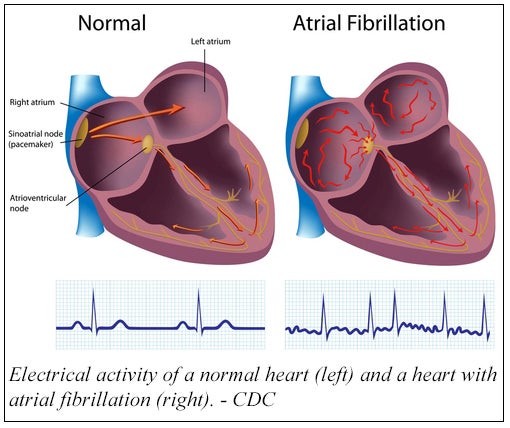
If your heart’s aflutter, a poet may say the nervous excitement you feel is because you are in love. Your doctor, however, will tell you that your heart’s flutter could be a sign of a serious condition: atrial fibrillation.
“Atrial fibrillation (AFib) is a serious heart condition that can lead to stroke, heart failure and other complications if left untreated,” says Sean Mazer, MD, FHRS, FACC, electrophysiologist and President of New Mexico Heart Institute/Lovelace Medical Group. “AFib causes your heart to beat irregularly, increasing the risk of blood clots forming in your heart.”
Symptoms of AFib
People with AFib can experience some of the following symptoms:
- General fatigue
- Rapid and irregular heartbeat
- Fluttering or “thumping” in the chest
- Dizziness
- Shortness of breath and anxiety
- Weakness
- Faintness or confusion
- Fatigue when exercising
- Sweating
- Chest pain or pressure. *You may be having a heart attack. Call 911 immediately.

The Centers for Disease Control and Prevention (CDC) estimate that 2.7 to 6.1 million Americans are currently diagnosed with AFib, a number that is expected to grow as America’s population ages. AFib is more likely to strike patients 65 years and older.
The American Journal of Managed Care (AJMC) predicts that more than 12 million people will be diagnosed with AFib by 2030. That number is projected to increase to 15.9 million by 2050.
AFib increases the risk of a stroke by 4-5 times, with 15-20% of all strokes attributed to AFib. While it is the fourth leading cause of death for women and fifth for women, stroke is also the most preventable cause of disability.
Risk Factors for AFib
If you have any of the following conditions/risk factors, especially the first two, you have a higher risk for AFib:
- Advancing age
- High blood pressure
- Obesity
- European ancestry
- Diabetes
- Heart failure
- Ischemic heart disease
- Hyperthyroidism
- Chronic kidney disease
- Heavy alcohol use
- Enlargement of the chambers on the left side of the heart
Treatments for AFib
- Medications to control the heart’s rhythm and rate
- Blood-thinning medication to prevent blood clots from forming and reduce stroke risk.
- Surgery
- Medication and healthy lifestyle changes to manage AFib risk factors
The growth in the number of AFib diagnoses is expected to continue for the next 30 years. Patients with the above risk factors should contact their primary care physician for more information on steps to better manage their health.
“If you experience symptoms like palpitations, dizziness or shortness of breath, it’s important to seek medical advice promptly,” says Sean Mazer, MD, FHRS, FACC, electrophysiologist and President of New Mexico Heart Institute/Lovelace Medical Group. “Early diagnosis and management can help prevent more severe outcomes and improve your heart health. Stay proactive and talk to your doctor about AFib today.”
For more information about our cardiology services or to make an appointment, visit lovelace.com.
Watch an animation of Atrial Fibrillation.




